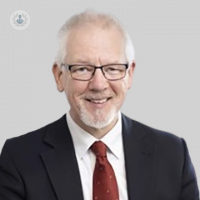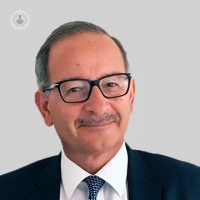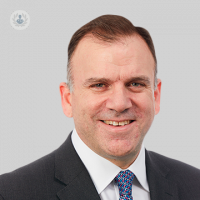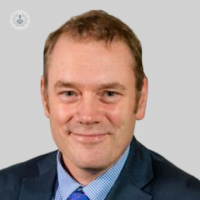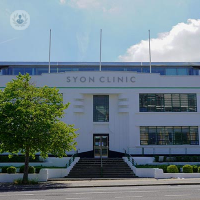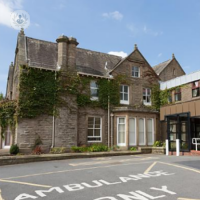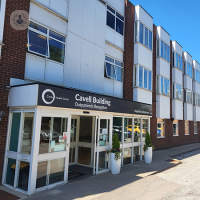What is shoulder replacement surgery?
Shoulder replacement surgery involves removing and replacing the damaged parts of the shoulder (usually the head of the humerus and scapula) with artificial implants. These are either made out of plastic or metal, or sometimes both. These implants are usually held in place using a special cement, or if they allow new bone growth, then cement is not required permanently. Although shoulder replacement surgery is less common than knee or hip replacement surgery, it can be just as effective in relieving shoulder joint pain.
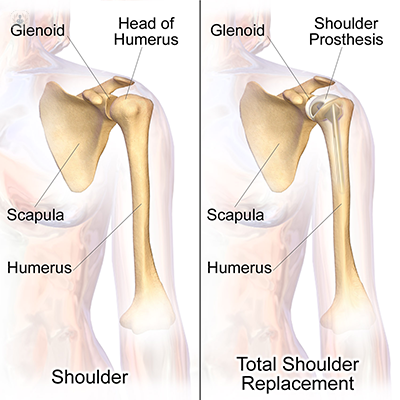
Why would you need shoulder replacement surgery?
Shoulder replacement surgery will usually be recommended if non-surgical treatments, such as medication or changes in physical activity have not been successful in relieving pain. You can experience shoulder pain for a number of reasons, including:
- age-related wear and tear shoulder arthritis
- rheumatoid arthritis
- injury-related arthritis
- rotator cuff tear
- severe shoulder fractures
- failed previous shoulder replacement surgery. This is known as revision shoulder replacement.
What does shoulder replacement surgery involve?
There are several types of shoulder replacement surgery:
- Total shoulder replacement – the arthritic joint surfaces are replaced with a metal ball (on the head of the humerus) and a plastic socket is attached to the shoulder joint.
- Stemmed hemiarthroplasty – just the ball of the shoulder joint is replaced.
- Resurfacing hemiarthroplasty – the head of the humerus is surfaced with a cap implant.
- Reverse total shoulder replacement – a metal ball is attached to the shoulder bone and a plastic socket is attached to the upper arm bone.
How to prepare for shoulder replacement surgery
Before surgery, certain medications will need to be stopped. It is also important to prepare your home prior to surgery, to make recovery easier. This includes, moving essential things to low-level shelves and having everything easily available. Before surgery you should wear loose-fitting clothes, with a button down shirt that allows easy removal after surgery. Surgery is performed with either general anaesthetic or regional anaesthetic.
Post-operative care
After surgery, you will be given antibiotics to lower the risk of infection. Your arm will be in a sling and will have minimal movement. Patients generally return home after 2-3 days following surgery. Pain medication will be prescribed for the short-term, but will be carefully monitored. Physical therapy is also crucial to a good recvoery, and soon after surgery movement will be possible. Driving is not permitted for two to four weeks following surgery.
03-12-2018 06-12-2023Shoulder replacement
Mr Andrew Chambler - Orthopaedic surgery
Created on: 03-12-2018
Updated on: 06-12-2023
Edited by: Jay Staniland
What is shoulder replacement surgery?
Shoulder replacement surgery involves removing and replacing the damaged parts of the shoulder (usually the head of the humerus and scapula) with artificial implants. These are either made out of plastic or metal, or sometimes both. These implants are usually held in place using a special cement, or if they allow new bone growth, then cement is not required permanently. Although shoulder replacement surgery is less common than knee or hip replacement surgery, it can be just as effective in relieving shoulder joint pain.

Why would you need shoulder replacement surgery?
Shoulder replacement surgery will usually be recommended if non-surgical treatments, such as medication or changes in physical activity have not been successful in relieving pain. You can experience shoulder pain for a number of reasons, including:
- age-related wear and tear shoulder arthritis
- rheumatoid arthritis
- injury-related arthritis
- rotator cuff tear
- severe shoulder fractures
- failed previous shoulder replacement surgery. This is known as revision shoulder replacement.
What does shoulder replacement surgery involve?
There are several types of shoulder replacement surgery:
- Total shoulder replacement – the arthritic joint surfaces are replaced with a metal ball (on the head of the humerus) and a plastic socket is attached to the shoulder joint.
- Stemmed hemiarthroplasty – just the ball of the shoulder joint is replaced.
- Resurfacing hemiarthroplasty – the head of the humerus is surfaced with a cap implant.
- Reverse total shoulder replacement – a metal ball is attached to the shoulder bone and a plastic socket is attached to the upper arm bone.
How to prepare for shoulder replacement surgery
Before surgery, certain medications will need to be stopped. It is also important to prepare your home prior to surgery, to make recovery easier. This includes, moving essential things to low-level shelves and having everything easily available. Before surgery you should wear loose-fitting clothes, with a button down shirt that allows easy removal after surgery. Surgery is performed with either general anaesthetic or regional anaesthetic.
Post-operative care
After surgery, you will be given antibiotics to lower the risk of infection. Your arm will be in a sling and will have minimal movement. Patients generally return home after 2-3 days following surgery. Pain medication will be prescribed for the short-term, but will be carefully monitored. Physical therapy is also crucial to a good recvoery, and soon after surgery movement will be possible. Driving is not permitted for two to four weeks following surgery.


Shoulder replacement surgery: what are my options?
By Miss Dimitra Leivadiotou
2024-12-20
Shoulder replacement surgery, also known as shoulder arthroplasty, is a medical procedure designed to alleviate pain and improve the function of a damaged or arthritic shoulder joint. This surgery involves replacing the damaged parts of the shoulder joint with artificial components, much like how a hip or knee replacement is performed. Experienced shoulder and elbow consultant Miss Dimitra Leivadiotou explains more about the surgery, including when it is necessary and the various options available. See more


An expert guide to shoulder replacement surgery
By Mr Adrian Simons
2024-12-19
Shoulder replacement surgery can relieve painful symptoms of arthritis and offer patients a better quality of life. In this article, respected consultant orthopaedic surgeon Mr Adrian Simons gives expert insight on how the procedure is performed and what results patients can expect. See more


Exploring new concepts in shoulder replacement
By Mr Andrew Sankey
2024-12-19
Advancements in orthopaedic surgery continue to shape the landscape of joint replacement, and the shoulder is no exception. Esteemed consultant orthopaedic surgeon Mr Andrew Sankey, who specialises in shoulder surgery, aims to provide simple and informative answers to key questions regarding new concepts in shoulder replacement. See more


Navigated shoulder replacement: A breakthrough in arthritis treatment
By Mr Andrew Chambler
2024-12-18
Shoulder arthritis, a common ailment affecting millions worldwide, often leads to debilitating pain and restricted mobility. For individuals facing advanced stages of this condition, shoulder replacement surgery emerges as a beacon of hope. However, not all cases are straightforward, and sometimes, the complexity of anatomy due to arthritis poses challenges for surgeons. This is where navigated shoulder replacement comes into play, revolutionising the landscape of shoulder surgeries. In his latest online article, Mr Andrew Chambler gives us his insights. See more
Experts in Shoulder replacement
-
Mr Simon Lambert
Orthopaedic surgeryExpert in:
- Arthritis
- Shoulder instability
- Rotator cuff surgery
- Rotator cuff injury
- Shoulder surgery
- Shoulder replacement
-
Mr Andrew Sankey
Orthopaedic surgeryExpert in:
- Shoulder replacement
- Rotator cuff surgery
- Shoulder instability
- Shoulder arthroscopy
- Sternoclavicular joint
- Fractured shoulder
-
Mr Ali Al-Sabti
Orthopaedic surgeryExpert in:
- Shoulder arthroscopy
- Rotator cuff surgery
- Rotator cuff injury
- Arthroscopic subacromial decompression
- Shoulder replacement
- Shoulder surgery
-
Mr Mark Falworth
Orthopaedic surgeryExpert in:
- Shoulder arthroscopy
- Shoulder replacement
- Elbow replacement
- Shoulder surgery
- Shoulder dislocation
- Rotator cuff surgery
-
Mr Phil Wright
Orthopaedic surgeryExpert in:
- Shoulder replacement
- Shoulder arthroscopy
- Rotator cuff injury
- Shoulder surgery
- Elbow Pain
- Platelet-rich plasma
- See all

Syon Clinic - part of Circle Health Group
Syon Clinic - part of Circle Health Group
941 Great West Rd, Brentford TW8 9DU
No existe teléfono en el centro.
By using the telephone number provided by TOP DOCTORS, you automatically agree to let us use your phone number for statistical and commercial purposes. For further information, read our Privacy Policy
Top Doctors

Beaumont Hospital - part of Circle Health Group
Beaumont Hospital - part of Circle Health Group
Old Hall Clough, Chorley New Rd, Lostock, BL6 4LA
No existe teléfono en el centro.
By using the telephone number provided by TOP DOCTORS, you automatically agree to let us use your phone number for statistical and commercial purposes. For further information, read our Privacy Policy
Top Doctors

The Cavell Hospital - part of Circle Health Group
The Cavell Hospital - part of Circle Health Group
Cavell Dr, Uplands Park Rd, Enfield EN2 7PR
No existe teléfono en el centro.
By using the telephone number provided by TOP DOCTORS, you automatically agree to let us use your phone number for statistical and commercial purposes. For further information, read our Privacy Policy
Top Doctors
-
Syon Clinic - part of Circle Health Group
941 Great West Rd, Brentford TW8 9DU, West LondonExpert in:
- Allergies nose and ears
- Allergy Dermatitis
- Allergy
- Clinical analysis
- Anxiety
- Digestive
-
Beaumont Hospital - part of Circle Health Group
Old Hall Clough, Chorley New Rd, Lostock, BL6 4LA, BoltonExpert in:
- Audiology
- General Surgery
- Orthopaedic surgery
- Dermatology
- Pain management
- Hernia
-
The Cavell Hospital - part of Circle Health Group
Cavell Dr, Uplands Park Rd, Enfield EN2 7PR, North LondonExpert in:
- endoscopy
- Gastroenterology
- Shoulder and elbow
- Hand and wrist
- Otolaryngology
- Foot and ankle
- See all
- Most viewed diseases, medical tests, and treatments
- Ulnar nerve entrapment
- Peripheral nerve block
- Peripheral neuropathy
- Joint pain
- Lumbar herniated disc
- Spinal surgery
- Minimal access surgery (keyhole surgery)
- Shoulder pain
- Osteoporosis
- Botulinum toxin (Botox™)

